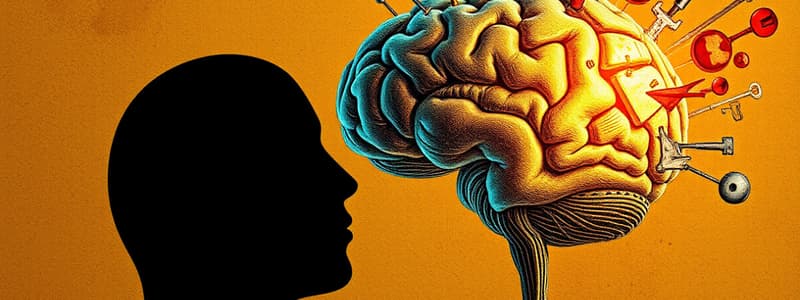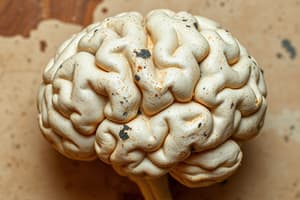Podcast
Questions and Answers
What is a key characteristic of learning as emphasized by multiple scholars?
What is a key characteristic of learning as emphasized by multiple scholars?
- Learning is a process that takes place over time. (correct)
- Learning is solely behavior modification.
- Learning is a passive process.
- Learning results from immediate events.
Which definition of learning refers to a change that is not short-term?
Which definition of learning refers to a change that is not short-term?
- Learning is temporary and transient.
- Learning leads to relatively permanent behavioral change. (correct)
- Learning is an immediate response to stimuli.
- Learning is a reaction to external factors.
What aspect does learning primarily focus on according to the attributes outlined?
What aspect does learning primarily focus on according to the attributes outlined?
- The emotional wellbeing of the learner.
- The immediate effects of learning.
- The content and structure of knowledge. (correct)
- The change in the behavior of the learner.
What initiates the change in behavior during learning?
What initiates the change in behavior during learning?
According to the commonly used definition in psychology, learning results in a change that is...
According to the commonly used definition in psychology, learning results in a change that is...
Which of the following is NOT a recognized attribute of learning?
Which of the following is NOT a recognized attribute of learning?
How do scholars suggest that experience influences learning?
How do scholars suggest that experience influences learning?
Which phrase best captures the essence of learning highlighted by scholars?
Which phrase best captures the essence of learning highlighted by scholars?
What is a key attribute of learning as discussed by Hall in 2003?
What is a key attribute of learning as discussed by Hall in 2003?
Which of the following is a reason some scholars argue parapsychology is not a science?
Which of the following is a reason some scholars argue parapsychology is not a science?
According to Breedlove et al. (2007), what characterizes the learning process?
According to Breedlove et al. (2007), what characterizes the learning process?
What can be a common consequence of learning in both humans and animals?
What can be a common consequence of learning in both humans and animals?
Which statement about the definition of learning is correct?
Which statement about the definition of learning is correct?
What does the term 'pseudo psychology' imply?
What does the term 'pseudo psychology' imply?
Which of the following can be considered a type of learning?
Which of the following can be considered a type of learning?
The study of the psychology of learning primarily investigates what aspect?
The study of the psychology of learning primarily investigates what aspect?
What is the primary mechanism through which classical conditioning occurs?
What is the primary mechanism through which classical conditioning occurs?
What does the neutral stimulus become after being paired with the unconditioned stimulus?
What does the neutral stimulus become after being paired with the unconditioned stimulus?
What happens during the extinction phase of classical conditioning?
What happens during the extinction phase of classical conditioning?
Which of the following is an example of spontaneous recovery?
Which of the following is an example of spontaneous recovery?
In the advertising example, what is considered the unconditioned stimulus (US)?
In the advertising example, what is considered the unconditioned stimulus (US)?
What is classical conditioning also known as?
What is classical conditioning also known as?
What type of response does a conditioned stimulus elicit?
What type of response does a conditioned stimulus elicit?
What role does a warm and nurturing teacher play in classical conditioning within a school setting?
What role does a warm and nurturing teacher play in classical conditioning within a school setting?
What type of learning is demonstrated when a child becomes scared of dogs after witnessing a dog attack?
What type of learning is demonstrated when a child becomes scared of dogs after witnessing a dog attack?
In the context of food aversion, what does the food's appearance, smell, or taste represent?
In the context of food aversion, what does the food's appearance, smell, or taste represent?
What is the role of the organism in operant conditioning?
What is the role of the organism in operant conditioning?
How does punishment influence a child's behavior towards exams?
How does punishment influence a child's behavior towards exams?
What is an example of operant conditioning with children?
What is an example of operant conditioning with children?
What does the term 'instrumental learning' refer to in the context of operant conditioning?
What does the term 'instrumental learning' refer to in the context of operant conditioning?
What behavior might be reinforced through operant conditioning in a workplace setting?
What behavior might be reinforced through operant conditioning in a workplace setting?
Which of the following best illustrates a classical conditioning response?
Which of the following best illustrates a classical conditioning response?
What primarily causes changes in a learner's behavior?
What primarily causes changes in a learner's behavior?
Which aspect is NOT explicitly mentioned as a domain of learning?
Which aspect is NOT explicitly mentioned as a domain of learning?
Which type of learning includes the acquisition of physical skills?
Which type of learning includes the acquisition of physical skills?
Learning can lead to changes in behavior. Which of the following best describes these changes?
Learning can lead to changes in behavior. Which of the following best describes these changes?
What is one of the key benefits of learning as mentioned?
What is one of the key benefits of learning as mentioned?
What does effective social interaction depend on?
What does effective social interaction depend on?
Which of these processes represents an internal aspect of learning?
Which of these processes represents an internal aspect of learning?
Which domain includes the acquisition of attitudes and values?
Which domain includes the acquisition of attitudes and values?
Flashcards are hidden until you start studying
Study Notes
The Psychology of Learning
- Learning involves how humans and animals acquire knowledge and skills through interaction with their environment.
- Different scholars provide various definitions, highlighting its complexity and multi-faceted nature.
- Commonly accepted definitions emphasize that learning leads to relatively permanent changes in knowledge or behavior due to experience.
Attributes of Learning
- Process Over Time: Learning is not a singular event; it involves a series of interactions and experiences.
- Long-Term Change: Changes resulting from learning are enduring, unlike temporary changes from external factors like drugs or fatigue.
- Knowledge Change: The primary focus of learning is on the transformation of knowledge structures, not just observable behavior.
- Experience as Catalyst: Learning necessitates prior experience, which acts as the catalyst for behavioral changes.
- Hidden Processes: The learning process is often internal and not directly observable; behavior changes reflect this internal learning.
- Behavioral Outcomes Vary: Learning can lead to changes that are either desirable or undesirable, impacting overall behavior.
Relevance of Learning
- Essential for acquiring life skills, knowledge, and effective social interaction.
- Supports adaptation to environments and contributes to overall well-being and emotional maturity.
Domains of Learning
- Psychomotor Domain: Involves physical skills such as walking and talking.
- Cognitive Domain: Encompasses the ability to acquire, retain, and organize information for problem-solving.
- Affective Domain: Relates to the development of attitudes, values, and feelings.
Types of Learning
-
Classical Conditioning (CC):
- Discovered by Pavlov, involving the association of stimuli.
- Involves a Neutral Stimulus (NS) becoming a Conditioned Stimulus (CS) after being paired with an Unconditioned Stimulus (UCS).
- Key processes include extinction (loss of association), spontaneous recovery (reemergence of association), and learning by association.
- Common applications include advertising, where positive emotions are associated with products.
-
Operant Conditioning:
- A neo-Behaviorist theory where behavior is shaped by expected consequences.
- Learning is active; individuals operate in their environment to influence their outcomes.
- Known as instrumental learning, as individuals actively engage in the learning process.
- Practical applications include reward systems in parenting and workplaces, motivating desired behaviors through incentives.
Application of Learning Theories
-
Classical Conditioning Examples:
- Advertising exploits children's association between play (UCS) and toys (CS) for consumer behavior.
- Fear responses can arise from negative experiences, such as a traumatic dog encounter resulting in a phobia.
-
Operant Conditioning Examples:
- Reward structure where parents incentivize children to complete chores.
- Workplaces using bonuses to reward employees, influencing task completion behavior.
These insights form the foundation of understanding the psychology of learning within allied health sciences and beyond.
Studying That Suits You
Use AI to generate personalized quizzes and flashcards to suit your learning preferences.



